Beirut: The Kurdish-led force controlling northeast Syria said Wednesday it had reached a US-brokered ceasefire with Turkish-backed fighters in Manbij, after Islamist-led rebels toppled Bashar Assad’s government.
The clashes in Manbij, an Arab-majority city, have killed 218 combatants since Turkish-backed groups launched offensives in the north following the ouster of Assad on Sunday.
“We have reached a ceasefire agreement in Manbij via US mediation,” said Syrian Democratic Forces commander Mazloum Abdi.
He said fighters of the SDF-affiliated Manbij Military Council “will be withdrawn from the area as soon as possible.”
“Our goal is to reach a ceasefire across Syria and start a political process for the future of the country,” Abdi added.
Abdi had told reporters last week that the United Nations had been in touch with the SDF about helping to “shape a political resolution for Syria” as rebels seized power.
The US-backed SDF fighters spearheaded an offensive that defeated the Daesh group’s self-declared caliphate in Syria in 2019.
On Tuesday, US Central Command said its chief General Michael Kurilla had visited US bases and SDF partners in Syria.
Earlier this month, the pro-Turkiye fighters seized the strategic northern enclave of Tal Rifaat from Kurdish forces, according to the Syrian Observatory for Human Rights war monitor.
Ankara sees the Syrian Kurdish People’s Protection Units (YPG), which dominate the SDF, as an offshoot of the banned Kurdistan Workers’ Party (PKK).
Arab-majority Tal Rifaat and Manbij are among three Kurdish-held areas in the north that Turkish President Recep Tayyip Erdogan had repeatedly threatened to seize.
Kurdish-led force announces US-brokered truce in Syria’s Manbij
https://arab.news/rkqpz
Kurdish-led force announces US-brokered truce in Syria’s Manbij

- US-backed SDF fighters spearheaded an offensive that defeated the Daesh group’s self-declared caliphate in Syria in 2019
- US Central Command said its chief General Michael Kurilla had visited US bases and SDF partners in Syria
Shiny and deadly, unexploded munitions a threat to Gaza children

- “We’re losing two people a day to UXO (unexploded ordnance) at the moment,” says former UK military deminer
- UN Mine Action Service says it could take 14 years to make the coastal territory safe from unexploded bombs
JERUSALEM: War has left Gaza littered with unexploded bombs that will take years to clear, with children drawn to metal casings maimed or even killed when they try to pick them up, a demining expert said.
Nicholas Orr, a former UK military deminer, told AFP after a mission to the war-battered Palestinian territory that “we’re losing two people a day to UXO (unexploded ordnance) at the moment.”
According to Orr, most of the casualties are children out of school desperate for something to do, searching through the rubble of bombed-out buildings sometimes for lack of better playthings.
“They’re bored, they’re running around, they find something curious, they play with it, and that’s the end,” he said.
Among the victims was 15-year-old Ahmed Azzam, who lost his leg to an explosive left in the rubble as he returned to his home in the southern city of Rafah after months of displacement.
“We were inspecting the remains of our home and there was a suspicious object in the rubble,” Azzam told AFP.
“I didn’t know it was explosive, but suddenly it detonated,” he said, causing “severe wounds to both my legs, which led to the amputation of one of them.”
He was one of hundreds of thousands of Palestinians returning home during a truce that brought short-lived calm to Gaza after more than 15 months of war, before Israel resumed its bombardment and military operations last month.
For Azzam and other children, the return was marred by the dangers of leftover explosives.
Children are most vulnerable
Demining expert Orr, who was in Gaza for charity Handicap International, said that while no one is safe from the threat posed by unexploded munitions, children are especially vulnerable.
Some ordnance is like “gold to look at, so they’re quite attractive to kids,” he said.
“You pick that up and that detonates. That’s you and your family gone, and the rest of your building.”
Another common scenario involved people back from displacement, said Orr, giving an example of “a father of a family who’s moved back to his home to reclaim his life, and finds that there’s UXO in his garden.”
“So he tries to help himself and help his family by moving the UXO, and there’s an accident.”
With fighting ongoing and humanitarian access limited, little data is available, but in January the UN Mine Action Service said that “between five and 10 percent” of weapons fired into Gaza failed to detonate.
It could take 14 years to make the coastal territory safe from unexploded bombs, the UN agency said.
Alexandra Saieh, head of advocacy for Save The Children, said unexploded ordnance is a common sight in the Gaza Strip, where her charity operates.
“When our teams go on field they see UXOs all the time. Gaza is littered with them,” she said.
Catastrophic situation
For children who lose limbs from blasts, “the situation is catastrophic,” said Saieh, because “child amputees require specialized long-term care... that’s just not available in Gaza.”
In early March, just before the ceasefire collapsed, Israel blocked all aid from entering Gaza. That included prosthetics that could have helped avoid long-term mobility loss, Saieh said.
Unexploded ordnance comes in various forms, Orr said. In Gaza’s north, where ground battles raged for months, there are things like “mortars, grenades, and a lot of bullets.”
In Rafah, where air strikes were more intense than ground combat, “it’s artillery projectiles, it’s airdrop projectiles,” which can often weigh dozens of kilograms, he added.
Orr said he was unable to obtain permission to conduct bomb disposal in Gaza, as Israeli aerial surveillance could have mistaken him for a militant attempting to repurpose unexploded ordnance into weapons.
He also said that while awareness-raising could help Gazans manage the threat, the message doesn’t always travel fast enough.
“People see each other moving it and think, ‘Oh, they’ve done it, I can get away with it,’” Orr said, warning that it was difficult for a layperson to know which bombs might still explode, insisting it was not worth the risk.
“You’re just playing against the odds, it’s a numbers game.”
Libya ‘crackdown’ forces aid groups to cease operations: diplomats

- Libya has struggled to recover from the chaos that followed the 2011 NATO-backed uprising that overthrew longtime dictator Muammar Qaddafi
TUNIS: Diplomats in Libya have said in a letter to authorities seen by AFP that several international humanitarian organizations were forced to suspend operations after threats by security services and forced resignations.
In the letter, which was obtained by AFP on Wednesday, 17 mainly European ambassadors and a UN official accuse the Internal Security Agency (ISA) of an “ongoing crackdown” on non-governmental groups and humanitarian aid workers.
In war-torn Libya split between two rival administrations, the ISA reports to the interior ministry in the capital Tripoli, seat of the UN-recognized government.
“Between March 13 and 27, the ISA summoned at least 18 staff members from six international NGOs for questioning,” said the letter addressed to the Tripoli-based foreign ministry.
ISA agents “seized some of their passports,” forced them to “resign from their positions” and pledge in writing never to work for an international NGO again, the letter added.
It also said the security service “sealed some of their offices.”
Beyond the six groups directly affected, the diplomats said that “many other organizations are suspending activities as a matter of precaution.”
AFP was not able to independently verify the claims made in the letter, dated March 27.
The authorities in Tripoli did not immediately comment on the matter, but announced a press conference later on Wednesday to address “the work of international NGOs.”
Libya has struggled to recover from the chaos that followed the 2011 NATO-backed uprising that overthrew longtime dictator Muammar Qaddafi.
It remains split between the UN-recognized government in Tripoli and a rival authority in the east, backed by military strongman Khalifa Haftar.
The diplomats’ letter does not name the organizations affected by the ISA’s alleged measures, but a source familiar with the issue said on condition of anonymity that they include the International Rescue Committee, the International Medical Corps and the Danish Refugee Council.
Contacted by AFP, the Danish Refugee Council said it “could not comment” on the matter. There was no immediate comment from the other groups.
The source said that some foreign NGO staff members had been ordered to leave Libya, while others had been barred from returning after recent trips abroad.
The source mentioned that the authorities had already imposed visa restrictions on foreign humanitarian workers between July 2022 and December 2023, but operations had continued using local staff or individuals who did not require visas.
In their letter, the diplomats from the European Union, France, Britain and other countries as well as a top UN humanitarian representative voiced concern about the impact of the measures.
The crackdown including detention and questioning of staff members has had a “particularly alarming” effect “on the provision of humanitarian primary health assistance,” the letter said.
It urged authorities to allow the NGOs to “reopen their offices and safely restart humanitarian operations as soon as possible.”
It also demanded that seized passports be returned to staff members, and “any resignation letters or pledges signed at the ISA office” invalidated.
Will US pressure on Iraq succeed in bringing Iran-backed militias to heel?

- The Popular Mobilization Forces are formally part of Iraq’s state security apparatus, but include powerful militias loyal to Iran’s IRGC
- A long-debated Iraqi law aims to regulate the PMF, but critics argue it will do little to curb their ties to Iran or ease American pressure
LONDON: It was a message that was both unequivocal and uncompromising. Iraq must rein in the sprawling network of militia groups that take their orders from Iran, and if they threaten American interests in the country, the US will respond.
The comments were delivered last week by Tammy Bruce, the US State Department spokesperson, in response to a question on a new law being wrangled over in Iraq about the future of the Popular Mobilization Forces.
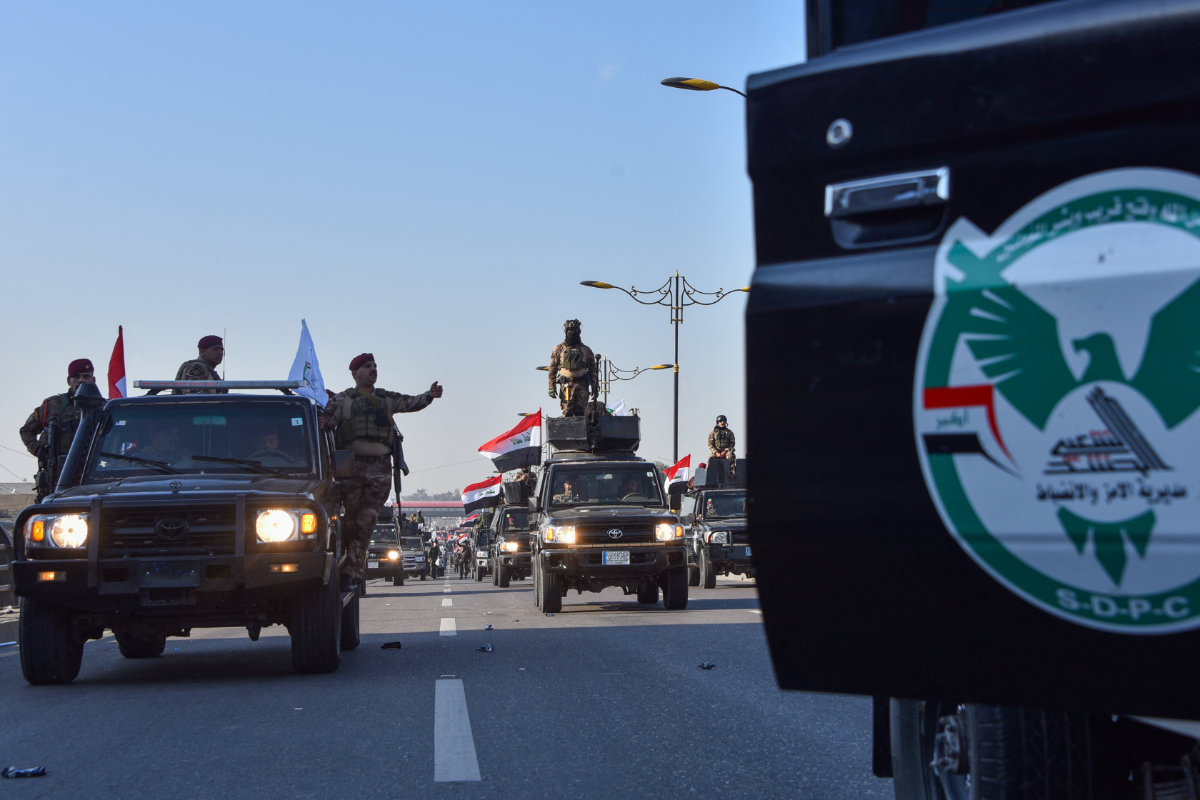
The PMF, an umbrella group for dozens of militias in Iraq, includes many that take their money and orders from Iran’s Islamic Revolutionary Guard Corps, despite belonging to Iraq’s formal state security apparatus.
Along with Hezbollah in Lebanon, the Houthis in Yemen, and Hamas in Gaza, they are considered part of Iran’s so-called “Axis of Resistance” — a network of proxy militias throughout the Middle East loyal to the IRGC.
America’s renewed military campaign against the Houthis, along with the degradation of Hamas and Hezbollah by Israel and the fall of Iranian ally Bashar Assad in Syria, has placed increased focus on Iraq’s Iran-backed militias.

They remain the only major Iranian proxy in the region to avoid significant Israeli or US military action since the Gaza conflict began in October 2023.
Doubts have been cast over whether the long-proposed Iraqi law to assert greater central government control over the militias would have much of an effect — or sufficiently appease US concerns.
But domestic events in Iraq, along with US President Donald Trump’s renewal of the “maximum pressure” campaign against Iran to suspend its nuclear program, place the PMF increasingly in the firing line.
There is a lot of pressure from the Trump administration on the government of Prime Minister Mohammed Shia Al-Sudani to rein in the Iran-backed militias, Renad Mansour, a senior Iraq research fellow at Chatham House, told Arab News. “Especially to stop any kind of attacks on American citizens or interests in Iraq.”
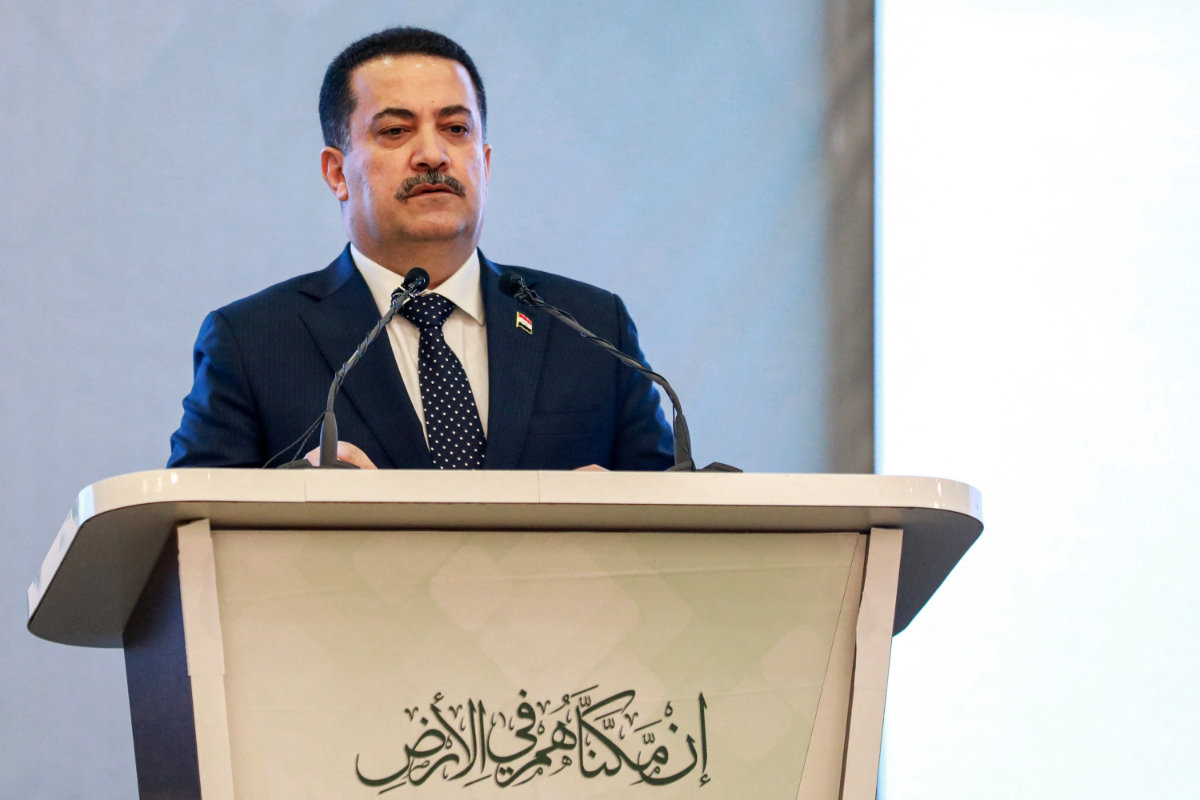
Mansour said the policy stemmed from renewed US efforts to combat Iranian influence in the region. “It’s very clear that the Trump administration is looking at Iraq as an important vehicle where Iran maintains economic and other types of authority,” he said.
The PMF, known in Arabic as Al-Hashd Al-Shaabi, was created in 2014 in response to a fatwa issued by the country’s top Shiite religious authority, Grand Ayatollah Ali Al-Sistani, after the extremist group Daesh seized swathes of territory.
The sprawling network of armed groups included many armed and funded by Iran. Many came from existing militias mobilized by the IRGC’s extraterritorial Quds Force.
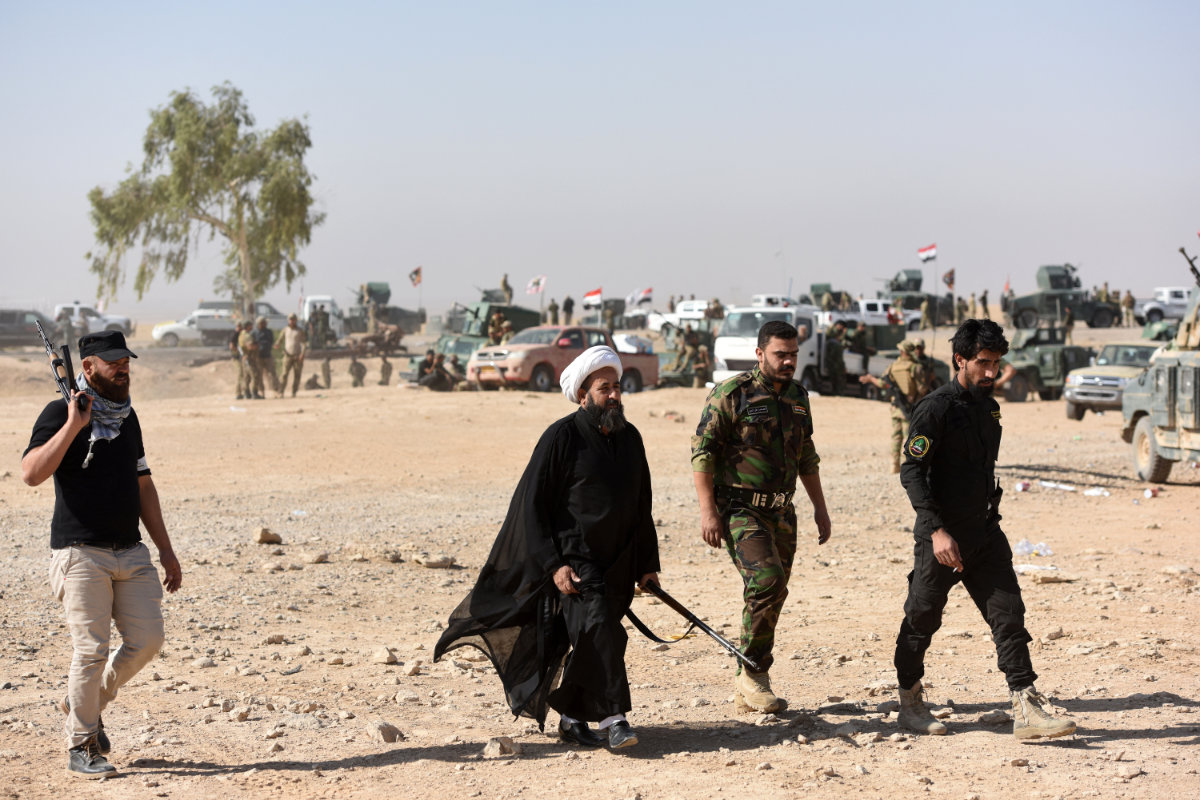
The PMF comprised approximately 70 predominantly Shiite armed groups made up of around 250,000 fighters. They played a major role in the defeat of Daesh in Iraq alongside the Iraqi Security Forces, Kurdish Peshmerga, and the US-led coalition.
After the extremist group was territorially defeated in Iraq in 2017 and attention turned to its holdouts in Syria, questions began to be raised over the purpose of the PMF.
A flimsy Iraqi law in 2016 attempted to exert more state control over the militias and included some basic details about their structure and employment terms.
IN NUMBERS
• 250k Fighters the PMF claims to have under arms.
• $3.3 billion Iraqi state funding at the PMF’s disposal.
Meanwhile, the PMF developed political wings that contested elections. These party blocs were accused by political rivals and Western governments of causing instability and acting in Iran’s interest.
The militias suffered a major blow in January 2020 when the first Trump administration killed PMF chief Abu Mahdi Al-Muhandis alongside Quds Force commander Qassem Soleimani in a drone strike near Baghdad airport.
Later that year, Al-Sistani, who had given the PMF its religious legitimacy when it was originally formed, withdrew his own factions as concerns over Iranian influence grew.
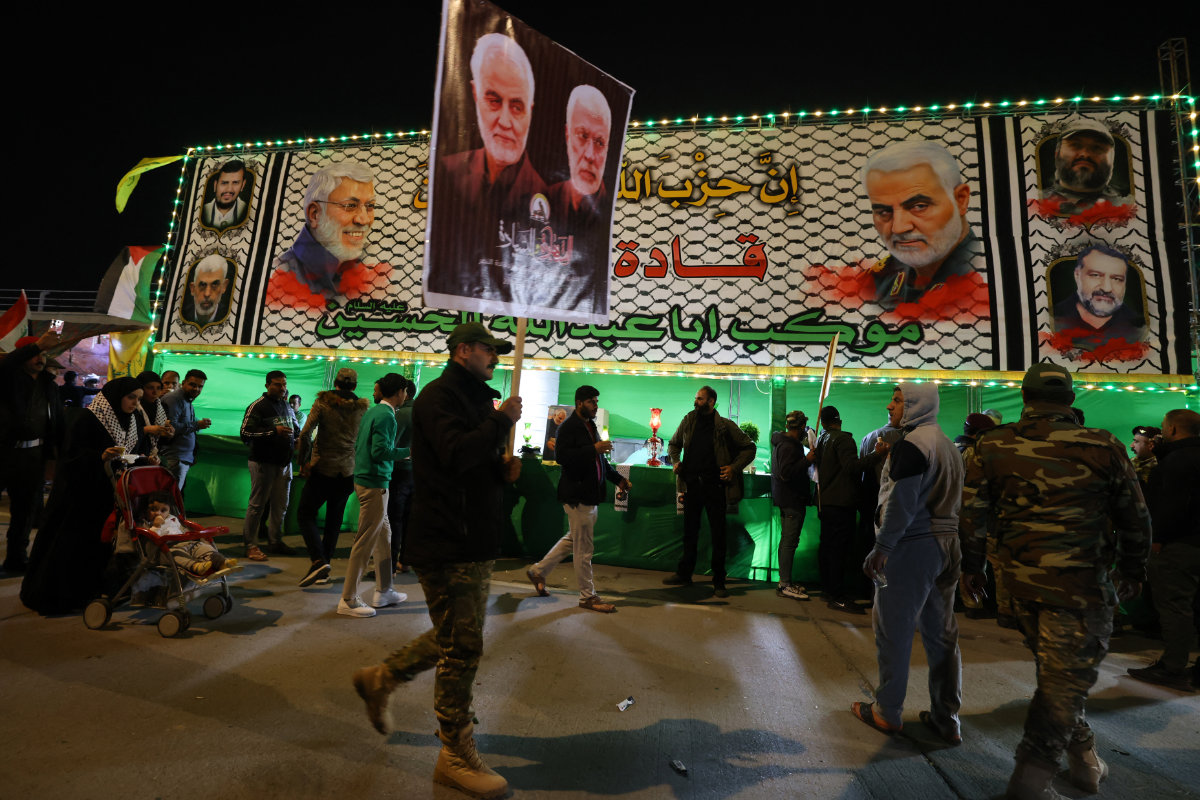
Yet the PMF managed to rebound from these setbacks, increasing both its funding and armory, including Iranian drones and missiles.
It has also been at the center of domestic turmoil, with its factions accused of an assassination attempt on then-Prime Minister Mustafa Al-Kadhimi in November 2021 and militias clashing with supporters of cleric Muqtada Al-Sadr in 2022.
After the Gaza war began in October 2023, the militias launched drones and missiles at Israel and carried out dozens of attacks on US bases in Iraq, where some 2,500 troops remain as part of the coalition mission against Daesh.
In February last year, the Biden administration bombed 85 militia targets in Iraq and Syria after three US soldiers were killed in a drone attack on a Jordanian outpost known as Tower 22.
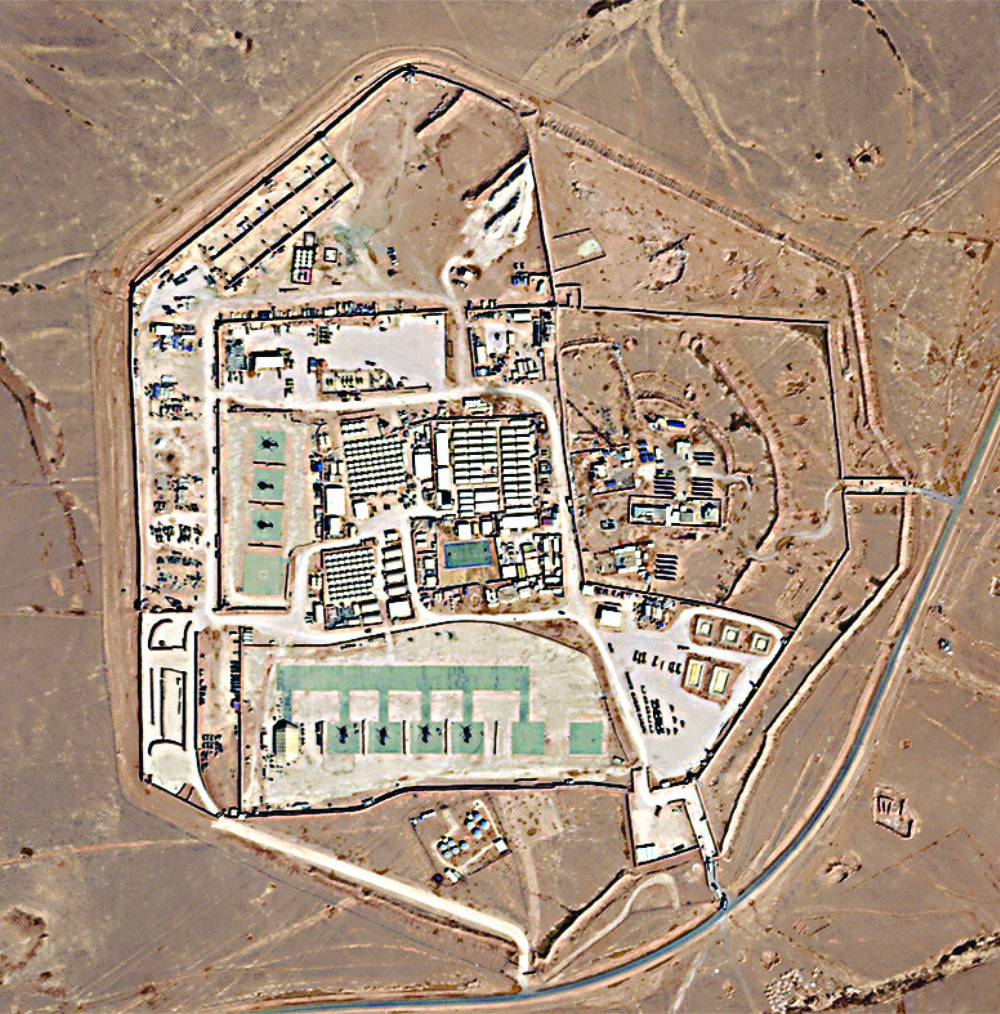
The US said senior commanders from the Kataib Hezbollah militia were among those killed. Since then, Iran has urged its militias in Iraq to refrain from attacking US interests.
“The Iraqi militias’ harassment of US targets in Iraq ended when the Biden administration took out three top commanders from the Kataib Hezbollah,” Hussain Abdul-Hussain, a research fellow at the Washington-based Foundation for Defense of Democracies, told Arab News.
“This signaled to militia leaders that their safety became at risk and their attacks stopped.”
The second Trump administration made clear in February when it issued the National Security Presidential Memorandum that Iraq’s militias would be central to renewed pressure on Iraq to reduce economic ties to Iran.
The other front is for Iraq to reduce dollar transactions with Tehran, particularly through cutting purchases of energy.
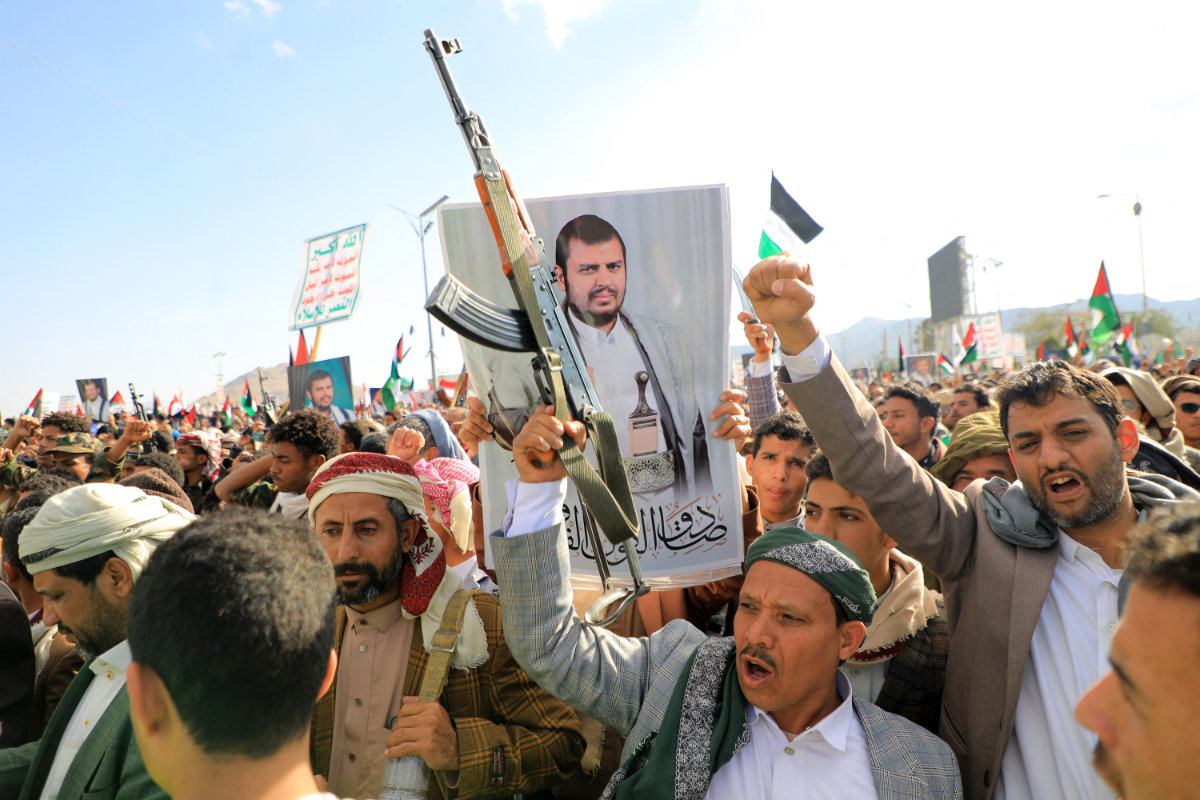
But there is also the wider geopolitical pressure on the militias as a result of US and Israeli attacks on Iran’s other proxies in the region, including Hamas, Hezbollah, and the Houthis.
“The Iraq militias became the last resort for all other Iranian militias across the region,” said Abdul-Hussain. “Since Israel crushed Hezbollah in Lebanon and Syria, the pro-Iran militia weight has shifted to Iraq.”
On the economic pressure now being exerted on Iran, he said the US is aware that the IRGC is siphoning US dollars from Iraq’s oil revenues, mainly using the $3.3 billion budget allocated to the PMF.
In response to this renewed pressure, the PMF Service and Retirement Law was introduced to the Iraqi parliament last week after months of wrangling over its contents.

The bill aims to fully integrate the PMF into Iraq’s state security forces. However, critics say it has been hijacked by rival Shiite blocs jostling for advantage within the organization.
In its current form, the bill is unlikely to fill the US with confidence that the PMF will fully submit to central government control and renounce fealty to Iran. Abdul-Hussain described the bill as a “total smoke screen.”
He said: “Parliament is trying to enshrine PMF perks by law for fear that the next executive chief might not be Iran-friendly and could thus cut the $3.3 billion with a decree. Laws trump decrees, and that’s why the Iraqi parliament is racing to enshrine PMF funding in a law.
“The irony is that the same law does not demand that the organization follow a military order or be included under the military’s rank or supervision. They want to take the money but keep the hierarchy in the hands of the IRGC.”

Israel’s military faces backlash over AI ‘Ghibli-style’ social media posts

- Attempt to jump on trend of posting AI-generated images in style of famed Japanese animation studio
LONDON: An attempt by the Israeli military to jump on the bandwagon of a social media trend that uses AI-generated images in the style of a legendary Japanese animation studio has spectacularly backfired.
The internet has been flooded by images in the style of Studio Ghibli after ChatGPT maker OpenAI launched a new image generator last week.
The craze has intensified debate over the extent to which artificial intelligence models breach copyright of artists. It also contrasts the painstaking work that goes into meticulously crafting the beautiful hand-drawn films produced by Studio Ghibli with the instant gratification culture fed by social media and the emergence of AI models.
Not wanting to be left out, the Israel Defense Forces on Sunday posted four images depicting different branches of its military in the Ghibli style on its social media accounts.
“We thought we’d also hop on the trend,” the post said.
What followed was a barrage of responses, many angry, many humorous, denouncing and mocking the post.
The images were shared as Israel intensified the bombing of Gaza where it has already killed more than 50,000 Palestinians and forced the population to flee their homes in an action it began in October 2023.
Many responded with AI-generated images in the Ghibli style on X that depicted Israeli brutality in the Palestinian territory.
The counter-images depicted Israeli soldiers mocking a blindfolded and handcuffed Palestinian child, and IDF troops pointing rifles at women and children against a backdrop of devastation.
“Colonizing art too,” read one reply in reference to Israel’s building of illegal settlements and its occupation of Palestinian land.
Other users pointed out that Hayao Miyazaki, the co-founder of Studio Ghibli, is a staunch pacifist and that many of his films contain strong anti-war messages.
He famously refused to travel to the US in 2003 to attend the Academy Awards where his work “Spirited Away” won an Oscar.
A video from 2016 appears to show Miyazaki’s disdain for AI-generated imagery. A clip from a documentary shows Miyazaki saying he was “utterly disgusted” after seeing an AI demo.
Suspected US airstrikes in Yemen kill at least 6 people, Houthi rebels say

- In addition, US overnight air raids left four people dead in Hodeida
- Houthi-held parts of Yemen have witnessed near-daily attacks blamed on the United States
DUBAI, United Arab Emirates: Suspected US airstrikes battered rebel-controlled areas of Yemen into Wednesday, with the Houthis saying the attacks killed at least six people across the country.
Meanwhile, satellite images taken Wednesday and analyzed by The Associated Press show at least six stealth B-2 Spirit bombers now stationed at Diego Garcia in the Indian Ocean — a highly unusual deployment amid the Yemen campaign and tensions with Iran.
The intense campaign of airstrikes in Yemen under US President Donald Trump, targeting the rebels over their attacks on shipping in Mideast waters stemming from the Israel-Hamas war, has killed at least 67 people, according to casualty figures released by the Houthis.
The campaign showed no signs of stopping as the Trump administration again linked its airstrikes on the Iranian-backed Houthis to an effort to pressure Iran over its rapidly advancing nuclear program. While so far giving no specifics about the campaign and its targets, White House press secretary Karoline Leavitt put the overall number of strikes on Tuesday at more than 200.
“Iran is incredibly weakened as a result of these attacks, and we have seen they have taken out Houthi leaders,” Leavitt said. “They’ve taken out critical members who were launching strikes on naval ships and on commercial vessels and this operation will not stop until the freedom of navigation in this region is restored.”
The Houthis haven’t acknowledged the loss of any of its leadership so far — and the US hasn’t identified any official by name. However, messages released by the leak of a Signal conversation between Trump administration officials and their public comments suggest a leader in the rebels’ missile forces had been targeted.
Fatal strike reportedly targets Hodeida
A likely US airstrike targeted what the Houthis described as a “water project” in Hodeida governorate’s Mansuriyah District, killing four people and wounding others. Other strikes into Wednesday targeted Hajjah, Saada and Sanaa governorates, the rebels said. Into Wednesday night, the Houthis said some 17 strikes hit Saada, with a person being killed in a strike at Ras Isa port in Hodeida and another at a telecommunication site on Jebel Namah mountain in Ibb governorate.
The rebels say they’ve continued to launch attacks against US warships in the Red Sea, namely the aircraft carrier USS Harry S. Truman, which is carrying out the majority of the strikes on the Houthis. No warship has been struck yet, but the US Navy has described the Houthi fire as the most intense combat its sailors have faced since World War II.
The aircraft carrier USS Carl Vinson, now in Asia, is on its way to the Middle East to back up the Truman. Early Wednesday, Pentagon spokesperson Sean Parnell said that “additional squadrons and other air assets” would be deployed to the region, without elaborating.
More than 300 airmen and several A-10 Thunderbolt IIs have deployed into the Middle East as well to support the mission from the Idaho Air National Guard. The troops, from Idaho’s 124th Fighter Wing out of Boise, fly the aircraft known as the Warthog. The US military’s Central Command, which oversees Mideast operations, posted an image Wednesday of two A-10s flying in the region.
More B-2s seen at Diego Garcia
Satellite photos taken Wednesday by Planet Labs PBC and analyzed by the AP showed at least six nuclear-capable B-2 bombers deployed to Camp Thunder Bay on Diego Garcia in the Indian Ocean.
The deployment represents nearly a third of all the B-2 bombers in Washington’s arsenal. It’s highly unusual to see that many at one base abroad. Typically, so-called show of force missions involving the B-2 have seen two or three of the aircraft conduct operations in foreign territory.
The B-2, which first saw action in 1999 in the Kosovo War, is rarely used by the US military in combat, because each aircraft is worth around $1 billion. It has dropped bombs in Afghanistan, Iraq and Libya as well. The bombers are based at Whiteman Air Base in Missouri and typically conduct long-range strikes from there.
The US has used the B-2 in Yemen last year to attack underground Houthi bases. The B-2 likely would need to be used if Washington ever tried to target Iran’s underground nuclear sites as well.
The Houthis on Tuesday said that they shot down another American MQ-9 drone over the country.
Intense US bombings began on March 15
An AP review has found the new American operation against the Houthis under Trump appears more extensive than those under former US President Joe Biden, as Washington moves from solely targeting launch sites to firing at ranking personnel and dropping bombs on cities.
The new campaign of airstrikes started after the rebels threatened to begin targeting “Israeli” ships again over Israel blocking aid entering the Gaza Strip. The rebels have loosely defined what constitutes an Israeli ship, meaning many vessels could be targeted.
The Houthis targeted more than 100 merchant vessels with missiles and drones, sinking two of them and killing four sailors from November 2023 until January of this year. They also launched attacks targeting American warships without success.
The attacks greatly raised the profile of the Houthis, who faced economic problems and launched a crackdown targeting dissent and aid workers in Yemen amid a decadelong stalemated war that has torn apart the Arab world’s poorest nation.




















